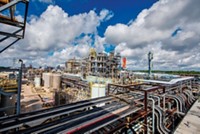Advertisement
Grab your lab coat. Let's get started
Welcome!
Welcome!
Create an account below to get 6 C&EN articles per month, receive newsletters and more - all free.
It seems this is your first time logging in online. Please enter the following information to continue.
As an ACS member you automatically get access to this site. All we need is few more details to create your reading experience.
Not you? Sign in with a different account.
Not you? Sign in with a different account.
ERROR 1
ERROR 1
ERROR 2
ERROR 2
ERROR 2
ERROR 2
ERROR 2
Password and Confirm password must match.
If you have an ACS member number, please enter it here so we can link this account to your membership. (optional)
ERROR 2
ACS values your privacy. By submitting your information, you are gaining access to C&EN and subscribing to our weekly newsletter. We use the information you provide to make your reading experience better, and we will never sell your data to third party members.
Business
BASF And ExxonMobil Boost Output In Europe
Intermediates: New capacity comes on line despite recession
by Marc S. Reisch
November 30, 2009

BASF and ExxonMobil Chemical have started up large European plant expansions on which construction began two years ago during better economic times.
At its integrated production site in Ludwigshafen, Germany, BASF started a cyclopentanone (CPon) and cyclododecanone (CDon) complex at a cost of $150 million. The plant has a capacity of 30,000 metric tons per year and adds 48 jobs to the site. CPon is an intermediate used to make pharmaceuticals, fragrances, and crop protection products; CDon is used to make nylon 12 plastics.
The start-up during difficult economic times "shows we have a long-term perspective," says Harald Schwager, the BASF board manager responsible for integrated site management in Europe.
To produce the intermediates, BASF is using a new three-stage process that takes advantage of nitrous oxide as well as other raw materials produced in Ludwigshafen. Nitrous oxide, a greenhouse gas, is a byproduct of another process at the site and is used for the first time in industrial-scale oxidation, the firm says.
Separately, ExxonMobil completed an expansion at its refinery and aromatics complex in Rotterdam, the Netherlands, that increases the site's annual p-xylene capacity by 25% to 700,000 metric tons and benzene capacity by 20% to 830,000 metric tons. P-xylene is a raw material for polyethylene terephthalate, and benzene is used in a wide array of products including nylon and polystyrene plastics.
ExxonMobil is also using new technology, which it calls PxMax, to produce p-xylene and benzene with less waste and energy compared with existing technologies. And, like BASF, ExxonMobil noted the challenges of bringing on new capacity during these times. "This expansion demonstrates ExxonMobil's commitment to invest across the business cycle," says T.J. Wojnar, senior vice president.



Join the conversation
Contact the reporter
Submit a Letter to the Editor for publication
Engage with us on Twitter